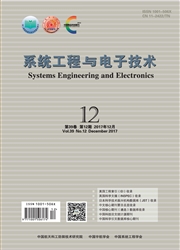

 中文摘要:
中文摘要:
核四极矩共振(nuclear quadrupole resonance,NQR)是一种固态射频谱分析技术,可用于检测高危险爆炸物。然而,核四极矩共振信号本身非常弱,并且易受线圈热噪声和射频干扰的影响,精确估计NQR信号参数成为难题。提出基于改进的快速最大似然估计的残余信号迭代分解算法估计NQR信号参数,该算法将多维搜索问题转化为多个一维搜索,在降低计算复杂度的同时提高了参数估计精度,有效地解决了干扰信号对NQR信号的遮蔽问题。仿真和实测数据的结果证明了该算法的有效性。
 英文摘要:
英文摘要:
Nuclear quadrupole resonance (NQR) is a solid-state radio frequency spectroscopic technique, al- lowing the detection of many high explosives. Unfortunately, NQR signals are inherently weak and Vulnerable both to the thermal noise of the coil and any radio frequency interference, and the precise estimation of the NQR signal parameters becomes a difficult problem. A residual signal iterative analysis algorithm based on improved fast maximum likelihood estimation is proposed to estimate the parameters of the NQR signal. The proposed method turns the multidimensional search problem into multiple one-dimensional searches to effectively solve the mask problem of the interference to the NQR signal, which simultaneously reduces the computational complexity and improves the estimated precision. The effectiveness of the proposed algorithm is demonstrated by the processing results of both simulated data and experimental data.
 同期刊论文项目
同期刊论文项目
 同项目期刊论文
同项目期刊论文
 期刊信息
期刊信息
